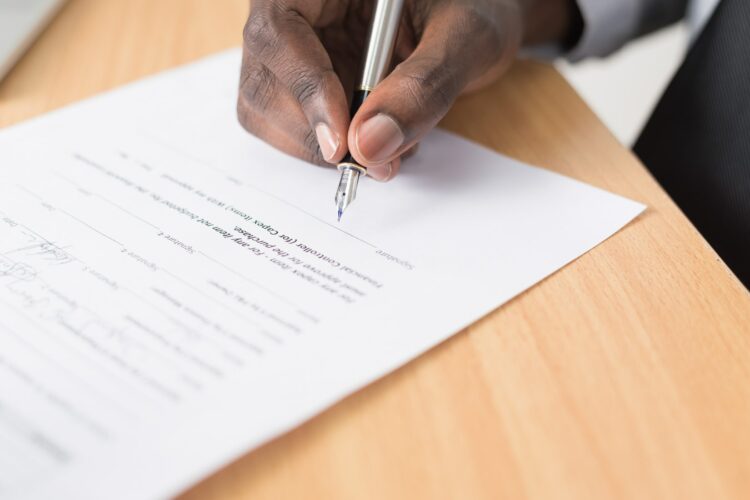What Is Contract Review?
Contract review is a process of reading and understanding a written agreement, often on a line-by-line basis. When a lawyer reviews a contract, they deeply analyze whether a contract is fair. They also look for loopholes to make sure you are protected once you sign the contract. A lawyer reviewing a contract may complete a few different key tasks, including:
- Examining the contract
- Explaining the contract to you
- Suggesting changes that would be in your best interest
Do You Need to Get a Contract Reviewed?
Contract review is an important component of any agreement made using a contract. This includes both business and personal contracts. All in all, if you’re making a decision using a contract, you want to make sure you do not have a legal issue later on by having a lawyer review that contract before you sign it. Reasons to obtain a legal review of any contract include:
- Guaranteeing legality: You want to know your contract will stand up in court if necessary. A contract review will make sure all the terms used in the contract are indeed lawful and legal.
- Preventing misunderstandings: Having a lawyer review your contract will help ensure that all terms in the contract are clear. That in turn prevents parties to the agreement from misunderstanding what they sign.
- Minimizing legal problems: By ensuring all terms in a contract are both legally binding and understood by the parties signing the agreement, a contract review makes it less likely that future legal issues will arise.
What Is the Contract Review Process Like?
A contract review lawyer works with contracts, doing everything from creating and revising the document to helping you negotiate a contract’s terms with the other parties. Contract review follows four general steps:
- Drafting the contract: A specific contract is created either by using a template or by having a lawyer write it.
- Reviewing the contract: A lawyer reviews the initial draft of the contract.
- Negotiating the contract: Once you have a contract draft you can work with, you can negotiate any changes you may want with the other parties (and vice versa).
- Signing the contract: After all parties to the agreement understand the terms of the contract and agree, everyone will sign the contract.
You can work with a lawyer to have a contract reviewed no matter which side of the process you are on. In other words, if you need to write a contract, a contract lawyer can be a big help. Likewise, if you are about to sign a big contract, you can first have that contract reviewed by a lawyer so you understand all terms and receive advice about any revisions you might need to request.
A contract review can highlight clauses or terms for you that are unclear or might cause problems in case of a dispute. The lawyer reviewing your contract can also show you clauses or terms that put you at a disadvantage or otherwise restrict your rights.
Once you understand your contract’s legal consequences following an initial contract review, the contract lawyer can advise you on the best next step to take. Typical courses of action after a contract review include:
- Signing the contract as it is written
- Asking the other party to make minor modifications
- Asking for major changes to the contract
- Drafting an entirely new contract and then sending it to the other party
- Renegotiating the entire deal
What Types of Contracts Should Be Reviewed?
It’s a good idea to have any type of contract reviewed before you sign it. Some common kinds of legal documents that require review include:
Employment Contracts
Employment contracts involving hiring someone to begin a new job or position. Key details of these contracts include:
- Benefits
- Compensation
- Exclusivity
- Intellectual property
- Job description
- Job security
- Non-compete clauses
- Non-solicitation clauses
- Start and end date
- Termination cause
Here is an article about employment contracts.
Freelancing Contracts
Freelancers may want to review larger contracts or contracts they plan to use frequently. Details reviewed will include:
- Deadlines
- Ownership of work
- Payment amounts
- Revisions
- Scope of work
- Termination
Real Estate Contracts
Many documents are involved with the selling, purchasing, or leasing of property. Examples include:
- Bills of sale
- Deeds
- Legal descriptions of property
- Mortgage loan documents
- Plot of land surveys
- Titles
- Title insurance
Here is an article about real estate contracts.
Purchase Agreements
Purchase agreements are contracts that transfer property such as vehicles, real estate, or other tangible assets from one party to another. Purchase agreements may involve many of the documents listed under real estate contracts as well.

Image via Unsplash via cytonn_photography
What Lawyers Look for During a Contract Review
A lawyer will look for many key details when reviewing a contract. This includes:
- Deadlines: If a task or tangible asset is due at a certain point, the contract should make this clear.
- Dispute resolution: A contract should clearly explain how parties can resolve disagreements that might arise over the course of the agreement.
- Blank spaces: A contract review will ensure you have not left any blanks unfilled in the contract. Though that may seem obvious, checking that all blanks have been filled in is very important. If you leave a space blank, someone could go back in and fill in something you would not otherwise agree to.
- Indemnification: Most contracts should have mutual language when it comes to indemnification. If a contract review reviews that only one party to the agreement is indemnifying, a lawyer will usually recommend you have that clause removed unless indemnification can be made mutual. Mutual language is important to include even in cases when one party could not be the cause of liability.
- Renewals: If a contract could be renewed automatically, the contract should specify whether or not you agree to automatic renewals.
- Representation: A contract should not give or accept any information that you do not know to be true.
- Responsibilities and rights: A contract should clearly explain what each party is entitled to as well as the obligations each party must fulfill.
- Risk allocation: A contract should detail how risk is allocated. Otherwise, you could run into a financial problem or another type of problem without clear guidance about who is at fault and how to fix the issue.
- Parties involved: A contract should use complete names to avoid confusion and list everyone involved in the agreement.
- Termination: A contract should specify possible causes for termination, detailing when, how, and under what specific terms a contract may end. A contract review will make sure the document contains appropriate language that defines the terms and process for breaking that contract.
- Terms: A contract is only a starting point, opening the possibility for further negotiation. You can negotiate terms you are not satisfied with. A lawyer reviewing the contract can point out terms that are not in your best interest. A lawyer will also check that all business terms used in the contract are accurate and legal.
- Warranties: Likewise, warranty terms should be clear in the final contract.
Whether you need to draft a contract or have received a contract to sign, you want to make sure you completely understand the terms and that the contract protects you legally. This is true of both business and personal contracts. Working with an experienced contract lawyer to review your contract will help you create a contract that does its job.







